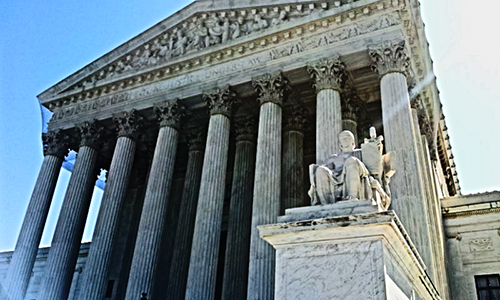The immigration case before the Supreme Court – United States v. Texas – will undoubtedly be affected by the death of Supreme Court Justice Antonin Scalia. Recall that the Obama administration wanted this case on the president's controversial amnesty program – Deferred Action for Parents of Americans and Lawful Permanent Residents (DAPA) – heard by the Court sooner rather than later, petitioning the Court to not wait for a full hearing on the merits to be conducted by lower courts. It is now a possibility that this desire to have this case heard quickly may backfire on the administration.

As a result of a lawsuit filed by Texas and 25 other states, President Obama's controversial program is currently held up in the courts, enjoined from going forward by a preliminary injunction. Texas argued to the Supreme Court that it should not take the case and should instead wait for the lower courts to conduct a full hearing on the merits. The Obama administration argued that the Court should take it up because a delay would be harmful to the administration's immigration enforcement (or non-enforcement) scheme. Politically, the Obama administration simply didn't want the issue going into 2017 when a new president, perhaps a Republican president, would have the opportunity to appoint a new justice to the Supreme Court.
In January, the Supreme Court agreed to hear the case and scheduled a hearing for this April. With this scheduling, there is no way for Scalia's seat to be filled before the hearing. As a result, there is a very real possibility that the Supreme Court will have a 4-4 split decision on this critical immigration case.
If United States v. Texas results a 4-4 split decision, it means that the lower court holding stands and President Obama's unilateral amnesty remains enjoined. Critical to this analysis, any opinion issued by the Supreme Court would not be precedent-setting. (It would also likely be quite short. For example, in a 4-4 case from 2010, the Court simply wrote: "The judgment is affirmed by an equally divided Court.")
What is unique in this situation is that the lower court's holding is in the injunction phase – a full trial on the merits of DAPA and the states' interests has not been held. This means that if the Supreme Court were to split evenly, a hearing on the merits of the case is still likely to be held at some point in the future by the lower court. At some point after that, it is possible that the case would get appealed back up to the Supreme Court. This would presumably happen after a new justice has been appointed and after a new president has been elected.
What's interesting about this is that if the Obama administration hadn't pressured the Court to take up the case, it could have slipped to the next term and perhaps the immigration case would not be on everyone's radar to the extent that it is now, making it easier for the president to persuade Congress to allow him to appoint a new justice later this year. It would be much more preferable from the administration's perspective to appoint a new justice before the immigration case is decided.
But now, the White House risks a 4-4 split decision which is not what it wanted. The White House does not want the issue returning to the lower courts and coming back up during the next presidency when perhaps even another justice might need to be appointed, perhaps by a Republican president.
Though it's impossible to predict how the Supreme Court might decide any case, and though it's impossible to understand why the Court agrees to take a case in the first place, this possibility of a 4-4 split could potentially affect how Justice Kennedy rules on the case. Consider the possibility that Kennedy feels it was premature to take the case since it was in the injunction phase; siding with the conservatives and creating a 4-4 split would allow the case to develop further in the lower courts. This is a safe, middle-of-the-road outcome that could be very appealing to Kennedy.
And there's more: Some argue that Justice Sotomayor should recuse herself from the case for having strong ties to some of the groups championing DAPA. If she were to do so, that would create the possibility of a 4-3 decision, one way or the other.
Ultimately, like so many other cases, United States v. Texas is more than likely going to come down to the opinion of Justice Kennedy.
